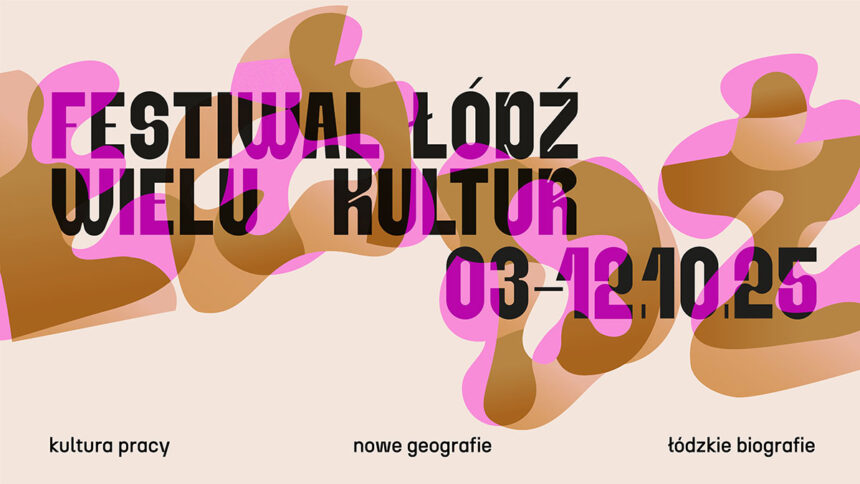
2025 Edition
Looking back
The Łódź of Many Cultures Festival has its roots in an event formerly known as the Festival of Dialogue of Four Cultures, later called the Łódź of Four Cultures Festival. It was established nearly 25 years ago, during a time when Łódź was trying to find its footing after the challenging transformations of the 1990s — searching for a new identity and rebuilding a sense of community. From the very beginning, the Festival had an important mission: to restore pride in the city’s local history and to remind people that Łódź has always been a city of many cultures. A city built together by Poles, Jews, Germans, Russians, and others — whose diversity has always been a strength, never a weakness.
Over time, the Festival has become a space to discuss what matters most today: how we live together, how we respond to exclusion, and how we build a community based on respect, human rights, and empathy. It has shown that dialogue between cultures doesn’t have to mean agreement at all costs, but rather a willingness to listen and work together.
What we observe today
Over the past two decades, Łódź has transformed — from a post-industrial city into a modern center of culture, education, and new technologies. Old factories have been given a new lease on life, and the streets are once again multilingual — more and more often we meet people from different parts of the world, sometimes coming from the other side of the globe. Since the 1950s, Łódź has been home to students from around the globe studying at the Polish Language Course for Foreigners (“Studium Języka Polskiego dla Cudzoziemców”). Today, these “new geographies” have become a natural part of the city’s landscape.
The understanding of culture itself has also evolved. Today, we don’t just talk about nations or religions, but also about the social and cultural identities that coexist in the city: feminist culture, queer culture, Vietnamese culture, Ukrainian culture, cultures of the African continent, the culture of people with disabilities, children and youth, as well as neighborhood and ecological cultures. We are increasingly aware that what we used to call native culture is just one part of a much larger global ecosystem — one we depended on in the past and one on which the future of all of us depends.
That’s why this year we will also look at Łódź from a post-colonial perspective. Although the city developed thanks to local labor, its industrial success was not separate from global processes of domination and exploitation. From a historical standpoint, we will discuss what often remains in the shadows — the origins of the cotton that flowed into Łódź’s factories in the 19th century, and the people who picked it — enslaved workers on plantations in the United States. Though geographically distant, Łódź was part of this network of connections: it benefited from resources and labor obtained under conditions of oppression, colonial domination, and racism.
This perspective places the history of Łódź within a broader—global—context. It reminds us that our city did not emerge in a vacuum but within a web of power, violence, and dependency relations that involved not only social classes but also racial and cultural divisions. This calls for not only a new way of looking at the past but also a critical reflection on today’s world—on how the traces of those past dependencies continue to shape our relationships, systems, and perceptions.
In this new reality, it is also important to look at what work was and what it is today with a sensitivity different from before — especially in Łódź, a city that for decades developed thanks to the efforts of thousands of people. Today, we want to talk about work ethics, social justice, and solidarity — including within the cultural sector itself, which also needs new, more sustainable solutions.
And let’s not forget the people who built this city. From the very beginning, the Festival has highlighted figures who were not always present in history textbooks but had a profound impact on shaping the local culture. This year, we bring to light the stories of Wanda Jakubowska, Dina Matus, Ida Brauner, and Joanna Kulmowa — courageous, committed, and creative women. Their biographies weave together diverse threads: artistic, social, political, and personal. All of them show that the city’s history often includes the invisible or overlooked, yet consistent and persistent work of women who gave this place not only its shape but also its meaning. In the Year of Łódź Women Initiators, we want to tell this story louder, more attentively, and with pride.
Our vision for tomorrow
Under the new banner – the Łódź of Many Cultures Festival – we are not abandoning the past. On the contrary: we hold on to it tightly, but we look forward. We want to be a mirror in which Łódź can see itself – but also a space that helps coping with change. We are building the city of the future: open, responsive, diverse, conscious.
The festival will host artists from various fields: theater, performance, literature, music, dance, visual arts and activism. We want to connect the international scene with the local one, large cultural institutions with small non-profit organizations, recognizable people with those who work “quietly” but just as importantly.
We believe that culture can be a space of encounter and dialogue and that Łódź is able, like no other city, to make something unique from this dialogue. Let’s build this common story together!
We invite you to have a look at the PROGRAM of this year’s edition.